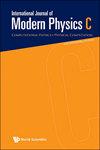多数决模式下的定向宣传
IF 1.6
4区 物理与天体物理
Q3 COMPUTER SCIENCE, INTERDISCIPLINARY APPLICATIONS
引用次数: 0
摘要
在过去的几十年里,广告和宣传不断发生变化,这主要归功于人们在网络平台和社交网络上的互动,如今,广告和宣传的目标受众已不再是大众,而是高度特定的网络受众。本研究探讨了这种直接面向特定受众的新媒体效应的影响,其中我们重点研究了多数决模型中代理人的意见演变,并考虑了定向宣传的存在。我们引入 $p$ 作为 "正面 "外部宣传的概率,引入 $q$ 作为代理人跟随外部宣传的概率。我们的结果表明,只有在两种情况下,即外部宣传不存在或媒体只倾向于两种意见中的一种时,才能达到通常的多数决模型静止状态,并达成完全共识。然而,即使外部宣传的影响很小,最终的状态也是多数人的意见占主导地位。对于宣传对代理人的影响足够大的情况,我们表明根本无法达成共识,并观察到意见的两极分化。此外,我们还通过分析和数值结果表明,在 p = 0.5 美元的情况下,系统会在 q_c = 1/3 美元时发生有序-无序相变。本文章由计算机程序翻译,如有差异,请以英文原文为准。
Directed propaganda in the majority-rule model
Advertisement and propaganda have changed continuously in the past decades, mainly due to the people's interactions at online platforms and social networks, and operate nowadays reaching a highly specific online audience instead targeting the masses. The impacts of this new media effect, oriented directly for a specific audience, is investigated on this study, in which we focus on the opinion evolution of agents in the majority-rule model, considering the presence of directed propaganda. We introduce $p$ as the probability of a"positive"external propaganda and $q$ as the probability to the agents follow the external propaganda. Our results show that the usual majority-rule model stationary state is reached, with a full consensus, only for two cases, namely when the external propaganda is absent or when the media favors only one of the two opinions. However, even for a small influence of external propaganda, the final state is reached with a majority opinion dominating the population. For the case in which the propaganda influence is strong enough among the agents, we show that the consensus can not be reached at all, and we observe the polarization of opinions. In addition, we show through analytical and numerical results that the system undergoes an order-disorder phase transition that occurs at $q_c = 1/3$ for the case $p = 0.5$.
求助全文
通过发布文献求助,成功后即可免费获取论文全文。
去求助
来源期刊

International Journal of Modern Physics C
物理-计算机:跨学科应用
CiteScore
3.00
自引率
15.80%
发文量
158
审稿时长
4 months
期刊介绍:
International Journal of Modern Physics C (IJMPC) is a journal dedicated to Computational Physics and aims at publishing both review and research articles on the use of computers to advance knowledge in physical sciences and the use of physical analogies in computation. Topics covered include: algorithms; computational biophysics; computational fluid dynamics; statistical physics; complex systems; computer and information science; condensed matter physics, materials science; socio- and econophysics; data analysis and computation in experimental physics; environmental physics; traffic modelling; physical computation including neural nets, cellular automata and genetic algorithms.
 求助内容:
求助内容: 应助结果提醒方式:
应助结果提醒方式:


